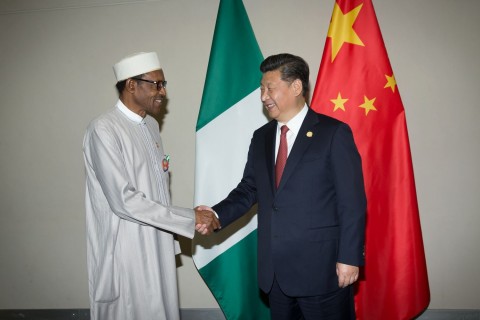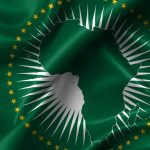What Does China’s One Belt One Road Strategy Mean For NigComSat -1R
Articles/Opinion, Featured, Latest Headlines Monday, May 16th, 2016
BALTIMORE, MD (AFRICAN EXAMINER) – China’s partnership with Nigeria in satellite technology is yielding dividends, but can Nigeria leverage President Xi’s One Belt One Road Initiative to further consolidate its space technology drive?, asks Idowu John Bakare
The NigComSat-1R project was considered ambitious when it was first conceived. For a country in dire need of urgent solutions to developmental challenges in areas such as health, food security, and education, launching a satellite communication system into orbit seemed somewhat flagrant.
There were obvious reasons for such cynicism. One, there was the popular disillusion after more than eight years of democracy without any apparent dividends. Many at the advent of civilian rule had erroneously equated democracy with the Biblical kingdom of God and its righteousness, which once attained brings unmixed blessings. But then, eight years into democratic government that had promised to alleviate poverty and improve the living conditions of the people, expectations were already at a breaking point for the much anticipated dividends of democracy. The average citizen could not see how launching a satellite can “put food on the table.”
So when the Chinese-built Nigerian Communication Satellite, dubbed NigComSat-1, the first of its kind in Africa, was first launched in 2007, it did not catch the public fancy.
However, 11 years down the line, the story seems different. “I can tell you that the reason for the lower telecom tariff, especially for internet calls, is attributable to NigComSat,” remarks Suleman Adamu, a business centre operator in Abuja. It is something that we should celebrate, he quipped as he led me into his modest business café partitioned to provide international calls from Nigeria to any part of the world. “Such calls are more expensive in places like Kenya, Tanzania or Egypt and it is because NigComSat has helped to bring the rate down in Nigeria”, he says.
Mr. Adamu did not put figures on his comparison. However, rates for international calls on the nonoh VOIP.Calls platform for instance, indicate thus: Kenya: $0.113 for landline calls and $0.181 for mobile; Egypt: $0.068 (landline) and $0,091 (mobile); Tanzania: $0.249 (landline) and $0.340 (mobile); South Africa: $0.045 (landline) and $0.170 (mobile) –compared to Nigeria’s $0.068 (landline) and $0.079 (mobile). Of course there are other factors that determine cheap and affordable calls such as demand and supply. The level of internet penetration is also a strong factor in determining cost. In Nigeria, the sudden boom of the telecommunication sector, its ubiquitous spread as well as its high penetration rate are all largely attributable to the communication satellite.
Experts say there are also many more benefits of space technology. All over the world, those who have invested in space technology did so because of the potential this has for assisting in the growth and development of their economies.
Ajayi Boroffice, a professor and chairman of Nigeria’s senate committee on science and technology, agrees. “First of all, the remote sensing satellite is a potent instrument in the area of earth observation. And when you talk of earth observation, it enhances the capability to map resources that can be utilised for economic purposes. For instance, you can use it to identify dammable rivers and streams in the country. And you know the importance of dams in terms of hydro-power electricity generation, irrigation and so many others.”
This, he reckons, has been achieved in Nigeria with the aid of NigComSat. “They have successfully mapped what is called the Fadama land in Nigeria. If you want to grow Fadama rice, you need to know the appropriate land to use. That is of economic importance. And l can give you more examples. If you want to construct a road, a railroad, you need to have the satellite image of that area so that in determining the route, it will help you to determine where there are mountains, where to avoid very difficult terrains and this will also give you the shortest distance between two points,” an elated Senator Boroffice says.
As the founding Director General of the National Space Research and Development Agency (NASDRA), it was under his leadership that Nigeria launched two satellites; a low orbit earth observation microsatellite (NigeriaSat-1) in 2003 and a communication satellite (NigComSat-1) in 2007. Senator Boroffice also laid the groundwork for the building of NigeriaSat-2 and NigeriaSat-X, which were launched in August 2011, from Russia.
“There is hardly any facet of the economy where this is not applicable,” he explains. “In the area of agriculture, it is also very useful in monitoring the health of crops and also in determining or estimating the yield of crop. This is very important when you can determine the yield of crops, if you don’t have the storage, then you can prepare to have more storage facility. The applications are enormous, it depends on how you want to use it. That is why you train people in different applications. It is useful in the military, it is useful in transportation, it is useful in security.
“Then, if you come to the communication satellite, of course, you talk of internet services, you talk of telephony, you talk of television, all these are made possible through satellite technology. So you can imagine the extent of growth. The ability to just call somebody on your phone, it saves you time. It boosts the economy because communication is very important in economy, internet, telephony, banking etc. The inter-connectivity between branches of banks is made possible by this. Right now if you have your bank branch in Maiduguri (north east Nigeria) you can from here in Abuja (north central) operate your account through internet systems. Similarly, if you consider what is happening now to what the situation was five years ago, you will see that there is a tremendous rise in the use of bandwidths, judging from the activities of the people. And one area you can assess that is social media. Social media is well utililised and they all depend on the bandwidth that is being made available. All these are the economic benefits of space technology.”
Experts have projected that more than 95 million US dollars can be saved for Nigerian broadband users each year and over 900 million US dollars can be saved for African users in the telephone relay and data exchange services and that the satellite can also share global business opportunities of 1.2 trillion USD. In addition, the satellite is positioned to play an important role in e-commerce, distance education and e-government. Nigeria is expected to get 70 million USD a year of NigComSat-1’s rental business. If the satellite communications capacity is running at full strength, it is estimated the Nigerian government can break even within six years, and the annual revenue of the satellite can surpass the revenue of the oil industry. So NigComSat, which is China’s first satellite export business deal, is believed to be on a slow but steady move towards the fulfilment of its mandate.
Built by the China Great Wall Corporation, NigComSat became the first African geosynchronous communication satellite when it was launched at 16:01 GMT on 13 May 2007, aboard a Chinese Long March 3B carrier rocket, from the Xichang Satellite Launch Centre in China.
With over 170 million people and some viable markets in neighbouring countries in the region, there is no question that the project is a viable business venture. With an estimated capacity to provide over 150,000 job opportunities, under current operating conditions, the Nigerian government believes that NigComSat-1 can effectively support poverty reduction efforts and promote socio-economic development, helping Nigeria and West African countries participate in the globalized economy.
Senator Boroffice ascribes the successful launch of Nigcomsat-1 to the cordial bilateral relationships between China and Nigeria, citing the recent signing of a contract by Nigeria to provide in-orbit tests for the Belarusian’s BELINTERSAT 1 satellite as an indication of flourishing business relations between the two.
The Nigerian government is hoping to make more gains from the satellite venture. In 2015, the country set in motion a transition plan to privatise NigComSat Ltd, managers of NigComSat-1. Managing Director and Chief Executive of Nigeria Communication Satellite Limited, Ms Abimbola Alele, estimated the market value of NigComSat ground infrastructure in Abuja and China at about $1 billion . However, she added that should government decide to increase commercialization efforts through additional critical infrastructure investment, then it would have the optimal asset utility to generate revenue and improve its financial profile to attract investors.
As part of Government’s efforts to expand technology to rural communities and to improve the delivery of ultra-high speed connectivity and content for the mainstream of Nigerian businesses, NigComSat has further embarked on the launch of its own Ka-band satellite solution.
NigComSat’s Head of Public Affairs, Adamu Idris, explained this further. “The Ka-band offers an advanced satellite system, yet affordable to Nigerians, most especially at the rural communities. For a start, we are working with our partners One Network and Clear Sky Broadband to provide Ka-band services to Nigeria’s Postal Service.”
With the introduction of the Ka-band satellite solution to Nigeria, NigComSat has laid a more solid foundation which has helped to revolutionalise satellite broadband services in Nigeria, with the aim of making it more affordable for small businesses and consumers. Adamu said, “Once NigComSat rolls out at the launch, Nigerians can reach out to any of our partners to get improved services at minimal rates. Our Ka-band satellite covers the entire West African region”. Before its introduction by NIGCOMSAT , Nigerians who used the Ka-band satellite broadband services have had to pay exorbitant fees to private service providers located in Europe and Asia, including other parts of the world for services that can be provided at a lower and more affordable rates locally.
Experts believe a lot more needs to be done. Five years into full operation it would appear NigComSat -1R is far from living up to its full potential. With a rising internet market, flourishing mobile telephone service environment among other business opportunities in broadband spectrum sales, especially for radio and television stations, experts are asking hard questions as to when NigComSat-1R would deliver fully on its promise.
In recent years there has been a leap in licensing approvals for private community radio and television stations by the Nigeria Communication Commission (NCC). Sadly many of these still rely on foreign service providers like Israeli and British firms for their bandwidth needs and at a huge cost in capital flight to the country. Again, Senator Boroffice blames this on two major factors: cynicism arising from lack of confidence by consumers; and low public awareness of the satellite itself. Explaining this further, he said, “We have only one satellite. We need to have backups because a television station cannot afford to shut down for five minutes. So, you need a back up. Supposing they migrate to NigComSat and NigComSat has a problem for 10 minutes, it means that Channels Television for instance, would be off the air for 10 minutes, it is going to lose a lot of customers and adverts.” He observed also that some local TV stations are not patronising NigComSat at the moment because of the long years of agreements they signed with foreign service providers.
Making NigComSat more competitive may well be the needed incentive to boost local patronage. There is one direction that Nigeria is looking for further assistance, i.e. to leverage its bilateral ties with China to tap into President Xi Jinping’s One Belt One Road (OBOR) initiative.
For China, the One Belt One Road initiative is a strategic move to, simply put, expand its business frontiers. Of course, it is much more than that. While the Belt manifests the continental dimension of its geo-strategic realm, consisting of a network of rail routes, overland highways, oil and gas pipelines and other infrastructural projects stretching from Xi’an in Central China through Central Asia and Russia and one artery crossing Kazakhstan and another going through Mongolia (but both linking up with the Trans-Siberian railway and going on to Moscow, Rotterdam and Venice) the Road is the maritime dimension and consists of a network of ports and other coastal infrastructure from China’s eastern seaboard stretching across South East Asia, South Asia, the Gulf, East Africa and the Mediterranean, forming a loop terminating at Piraeus (Greece), Venice (Italy) and Rotterdam (Netherlands) in Europe and Mombasa (Kenya) in Africa.
The OBOR initiative, as the name suggests, goes beyond the construction of physical infrastructure, even though this is an indispensable component of the initiative. It is not just an economic initiative. It has obvious political and security implications. But as pundits suggest, China’s strategists do not draw lines separating economic and security objectives. Each dimension reinforces the other, even though the economic dimension may sometimes mask the security imperative. OBOR is therefore part of an economic strategy that will enable China to deal with the problem of massive overcapacity in its industry. The infrastructure to implement OBOR requires vast amount of construction materials and capital equipment, sectors where China has vast unused capacity.
There is also the added incentive to export skilled and semi-skilled labour employed in these sectors, rendered surplus by a slowing Chinese economy. Significantly, such infrastructural investment requires significant financial flows. As pointed out by analysts, the OBOR initiative is underpinned by the Chinese-led Asian Infrastructure Investment Bank (with capital of $100 billion), the BRICS New Development Bank (with capital of $50 billion but this may rise to $100 billion) and a proposed Shanghai Cooperation Organisation Financing Institution. The inherent opportunities in such ventures, especially for developing economies, are mouth-watering.
President Xi, on his recent visit to Africa, announced China’s readiness to support infrastructure development on the continent. As highlighted by the Chinese authorities, the OBOR initiative includes a Digital Silk Road as well as a Silk Road in Cyber Space. There is a proposal for a cooperative Internet Plus Plan which would link the OBOR countries to a super-fast broadband network. Going by what is on paper, the OBOR maritime link to Africa is projected to terminate in Mombassa, Kenya. But stakeholders in the Nigerian information and communication sector believe that NigComSat is well positioned to benefit from this.
The argument here is that NigComSat aligns with China’s objectives as far as OBOR is concerned, and it should come as no surprise if China invests in those projects which are aligned to its OBOR objectives. Having spelt out its vision and a broad plan of action, China is now focusing on the deployment of the next phase, identifying ‘key directions, key countries and key projects’.
Not long ago, Chinese Ambassador to Nigeria, Gu Xiaojie was on a facility tour of the Abuja ground station of NigComSat-1R. According to him, the aim is to strengthen the mutual relationship between China and Nigeria. He stressed that Nigeria is a very important strategic partner of China in Africa. During the visit, Ms Alele briefed the Ambassador that the relationship between NIGCOMSAT and the China Great Wall Industry Corporation’s since the launch of the first communication satellite in 2007 has been cordial.
China attaches great importance to promoting financial integration among countries along OBOR. It seeks to do this both through the setting up of institutions (such as AIIB and the NDB) and the investment of substantial sums. Nigeria is not directly within the Belt and neither can the country be sighted on the existing Road. Yet Nigeria is of strategic importance to China within the continent, but can it leverage existing bilateral ties to secure further assistance within the provision of OBOR? Time will tell.
Related Posts
Short URL: https://www.africanexaminer.com/?p=32732






















